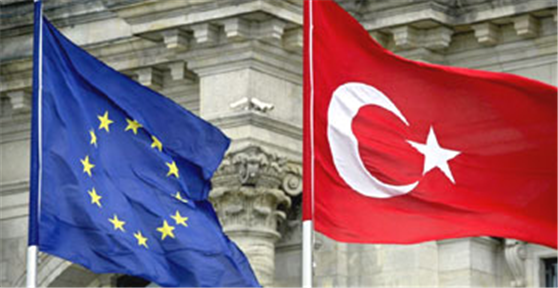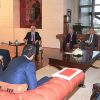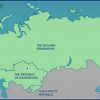Summary
Turkey’s accession process to the EU is in limbo: only 14 of the 33 chapters of the acquis that require negotiations have been opened in 10 years (the last one in November 2013) and just one provisionally closed. The main stumbling block is Turkey’s failure to implement the 2005 Additional Protocol to the Ankara Agreement and extend its customs union with the EU by opening its ports and airports to Greek-Cypriot traffic. As a result, the EU suspended at the end of 2006 the opening of eight chapters related to the Customs Union and announced that no more chapters would be provisionally closed until Turkey had fulfilled its commitment. France and Cyprus have unilaterally blocked other chapters. Turkey is still far from being a fully-fledged democracy, hampered by the actions of Recep Tayyip Erdoğan, the autocratic President. The landslide victory last April of the pragmatic Mustafa Akıncı in the presidential election in the Turkish Republic of Northern Cyprus raised hopes for reunification of Cyprus, divided since Turkey’s 1974 invasion of the island, although this is not part of the EU accession. While a window of opportunity has opened in Cyprus, the one provided in 2013 by a fragile ceasefire between the Turkish state and the insurgent Kurdistan Workers Party (PKK), following a brutal dirty war of 28 years that killed at least 40,000 people, was closed in July with a renewal of violence on both sides. The best way to keep Turkey on board, improve its flawed democracy and reinvigorate its EU negotiations would be to open the two chapters on judicial and fundamental rights and on justice, security and freedoms –core areas blocked by Cyprus since 2009–.
Background
The European Council of Ministers took a momentous decision and opened accession negotiations with Turkey 10 years ago this month, but progress since then has been painfully slow. Only 14 of the 33 chapters of the acquis that require negotiations have been opened (two of them do not) and just one (science and research) provisionally closed.
The country has been knocking at the EU’s door since 1963 when it became an associate member of the then European Economic Community (EEC), having applied in 1959 (see the timeline in Appendix 1). In 1987, one year after Spain joined the EEC, Ankara applied for full membership and in 1996 Turkey became the first and so far the only non-EU member to form a Customs Union with the EU for industrial goods and processed agricultural products. The decision of the December 1997 Luxembourg summit not to include Turkey among the 10 candidate countries who joined the EU in May 2004 and two more in 2007, caused a major rift with Ankara which virtually cut off relations with Brussels. The thaw lifted two years later at the Helsinki summit when Turkey’s status was upgraded from an applicant to a candidate country.
Turkey’s accession process is in a category of its own –very different to that of other applicants– because it is said to be ‘too big, too poor and too Muslim’, although there is no reason why the country’s size (its population of 76 million is slightly more than the combined populations of the 10 countries that joined the EU in 2004), its predominantly Muslim religion and economic underdevelopment in certain areas, most notably in the impoverished south-east, should be stumbling blocks on the road to accession. These factors fuel opposition to if not reticence about Turkey’s possible full membership among some populations and governments, particularly in Germany and France. This is bound to intensify with the recent avalanche of migrants into the EU although significantly Turks are not among those seeking to enter the Union. Indeed, Turks in the EU have been returning to their country for several years, something not widely known, as Turkey has become richer. The commonly held belief that Turks will flood the EU when and if it becomes a full EU member is a misconception that Ankara should be more proactive in trying to correct among the wider public.
The country’s special case was implicitly made clear in the negotiating framework produced by the Council of the EU when the green light was given to open the accession process (see Appendix 2). This enables the EU to determine opening and closing benchmarks for every chapter, in addition to long transition periods, derogations, permanent safeguard measures and grey areas like the EU’s ‘absorption capacity’. And there is no guarantee, unlike that which existed for all the other candidate countries, that completion of the accession process automatically brings with it full membership. It is not an irreversible process in which Turkey’s membership perspective becomes gradually clearer.
Indeed, the framework and subsequent declarations by some EU leaders have strengthened the feeling that the EU wants a ‘special partnership’ for Turkey and not full membership.
Nevertheless, a new if ambiguous reality was established for Turkey which was accepted by sceptics such as Wilfried Martens, the chairman and co-founder of the European People’s Party, who in 1997 cast doubts on Turkey’s accession. After negotiations began in 2005 Martens saw in it ‘a unique opportunity, as great as making peace between France and Germany after the War, or as reunifying Europe after the fall of the Berlin Wall in November 1989. These talks begin a dialogue between Christians and Muslims which could signal an extraordinary new beginning for the world as a whole’.3
The accession negotiations, however, have not laid to rest the issue of whether Turkey is really part of Europe, despite joining the Council of Europe in 1949, being a founding member of the Organisation for Economic Co-operation and Development (OECD) in 1961 and becoming a NATO ally in 1952 (with the second-largest standing military force after the US).
When Turkey became an associate member, there was no doubt in the mind of Professor Walter Hallstein, the President of the European Commission, on this issue. ‘Turkey is part of Europe’, he declared. ‘This is the ultimate meaning of what we are doing today. It confirms in incomparably topical form a truth which is more than the summary expression of a geographical concept or of a historical fact that has held good for several centuries’. The EU itself seemed to rebuff the geographical argument with the accession of Cyprus in 2004 (most of which is east of Ankara).4 Throughout the 19th century the Ottoman Empire was known as the ‘Sick Man of Europe’.
Three-quarters of foreign direct investment in Turkey comes from the EU, and the country is the Union’s sixth-largest trading partner. Some 55% of European economic legislation is reflected in corresponding Turkish law, and an estimated 150,000 Turkish entrepreneurs employ 600,000 workers inside the EU. It rightly rankles with the Turkish business community that despite their extensive activities with European companies the tough visa requirements have still not been eased.
It is one of the paradoxes of Turkey that it was not the political heirs of Mustafa Kemal Atatürk, the enlightened founder of the country’s republic in 1923, on the ruins of the Ottoman Empire, who started EU accession negotiations but the Justice and Development Party (AKP) of Recep Tayyip Erdoğan, which has its roots in political Islam and has been in power since 2002. Erdoğan became the first directly elected President in 2014 after serving as Prime Minister for 11 years.
Turkey was due to go to the polls on 1 November for the second time this year. The AKP won yet again the most seats in the parliamentary elections on 7 June with 41% of the vote, but not enough to retain the majority it had held for 12 years, largely because of the success of the pro-Kurdish People’s Democratic Party (HDP). The AKP also failed to form a coalition or minority government with parliamentary backing.
The AKP was initially reformist, particularly defanging the powerful military, the arbiter of political life, which intervened directly in politics three times between 1960 and 1980 and in 1997 shut down the ruling Islamist Welfare party (a precursor of the AKP) of Necmettin Erbakan without seizing power. The military has long seen itself as the ‘guardian of Turkish democracy’ and the defender of the secular state created by Atatürk.
Curbing the power and influence of the military was a key element in becoming an EU candidate country, and very much in the interests of the AKP’s Islamist agenda given the military’s anathema of anything that smacked of political Islam.
Twelve acquis chapters were opened between 2006 and 2009 and only two since then, underscoring the extent to which the pace of reform has decelerated (see Figure 1). The blame for this lies on both sides.

By making Turkey a special case, albeit for understandable reasons, given the complexity of the issue and the lack of a unanimous stance among EU countries, reinforced by the absence of an unequivocal commitment that Turkey will be accepted as a member, the incentive for reform has been weakened and with it the EU’s transformative power.
EU conditionality (the use of ‘carrots’ and ‘sticks’) was effective in 1999-2005 as Turkey got itself into shape to become a candidate country and saw the incentive to do so, but the EU no longer has any leverage. As there is no certainty of a reward at the end of the accession process (ie, full EU membership), the AKP, under the increasingly autocratic Erdoğan, feels under no pressure to move decisively and so proceeds at its own pace, dictated, at times, by the domestic political climate (for example, over the issue of the Kurds) and its own electoral interests. Sadly, Turkey does not have the same overwhelming political consensus that Spain had when it negotiated its EU accession.
The social-democratic Republican People’s Party (CHP), the main opposition and the oldest party in modern Turkey, is stuck in its Kemalist past, while the right-wing Nationalist Movement Party (MHP) rabidly waves the national flag. The AKP began as a broad mosque party that galvanised the disparate opposition to the status quo (known as the deep state) and endless bickering coalition governments, particularly in the more pious Anatolian heartlands. The AKP’s more liberal supporters have since drifted away, because of the country’s authoritarian drift, most notably and recently to the HDP in last June’s parliamentary election.
The protracted accession process, however, has not dented support among Turks for EU membership, which has been on the rise since 2013 after falling. Fifty-three per cent of respondents in 2014 said membership would be good, according to the German Marshall Fund of the United States, up from 45% in 2013, while 61.8% supported membership in a poll conducted by Turkey’s Economic Development Foundation (IKV) in April of this year. Expectations, however, that Turkey will become a full member –as opposed to support for the EU– have decreased.
The increased support for EU membership comes at a time when the economy is flagging after a period of stellar growth and the quality of Turkey’s democracy leaves a lot to be desired. This suggests that Turks, like Spaniards in the past, see Europe as the solution for their problems.
On the international front, the main stumbling block to progress in EU accession is Cyprus, as Turkey has still failed to implement the 2005 Additional Protocol to the Ankara Agreement and extend its Customs Union with the EU by opening its ports and airports to Greek-Cypriot traffic. As a result, the EU at the end of 2006 suspended the opening of eight chapters related to the Customs Union and announced that no more chapters would be provisionally closed until Turkey had fulfilled its commitment. The eight chapters are: free movement of goods, right of establishment and freedom to provide services, financial services, agriculture and rural development, fisheries, transport policy, customs union and external relations.
Ankara wants the EU to implement the decision of the Council of Ministers, taken on 26 April 2004, to end the isolation of the internationally unrecognised Turkish Republic of Northern Cyprus (TRNC), created after Turkey’s invasion of the country in 1974.5 The promise was made two days after Turkish Cypriots voted in favour of the Annan Plan to reunify the island (rejected by Greek Cypriots). Cyprus joined the EU on 1 May 2004 (the writ of EU law does not run in the TRNC) and since then has blocked the direct trade regulation needed to lift tariffs on TRNC goods.
Cyprus and France have also unilaterally blocked the opening of certain chapters. In 2007, France declared it would not allow the opening of five chapters: (1) agriculture and rural development (also blocked due to the Additional Protocol); (2) economic and monetary policy; (3) regional policy and coordination of structural instruments; (4) financial and budgetary provisions; and (5) institutions. The reason is that they are considered to be directly related with EU membership. France lifted its blockage of the chapter on regional policy and coordination of structural instruments in February 2013, enabling it to be opened in November that year (nothing has been opened since then).
In 2009 the Greek Cypriot government unilaterally stated it would block the opening of six chapters: (1) freedom of movement for workers; (2) energy; (3) judiciary and fundamental rights; (4) justice, freedom and security; (5) education and culture; and (6) foreign, security and defence policy.
The landslide victory of the pragmatic Mustafa Akıncı in the TRNC’s presidential election last April over the more inflexible Derviş Eroğlu raised hopes of progress finally being achieved in reunifying the island. Both Akıncı and Nikos Anastasiades voted in favour of reuniting Cyprus in the 2004 referendum. Reunification is not a prerequisite for EU membership, but would undoubtedly improve the atmosphere.
William Chislett
Associate Analyst, Elcano Royal Institute | @WilliamChislet3
1 William Chislett is the author of two books on Turkey (Euromoney), six working papers for the Elcano Royal Institute and a study for the Open Society Foundation (Istanbul) comparing Spain’s and Turkey’s EU trajectories. He has twice been a Visiting Scholar at Bilkent University, Ankara.
2 I would like to thank Bülent Algan of the University of Ankara, Dimitrios Dagdeverenis, Fiona Mullen, Ömer Önhon, Turkey’s ambassador in Madrid, and Fatma Yilmaz-Elmas of the International Strategic Research Organization in Ankara for their help in writing this Paper.
3 European Voice, 13-19/X/2005, p.9.
4 See the section on the history of Turkey and Europe in my 2004 Paper on the country (Turkey’s EU Membership: The Moment of Truth) for a fuller explanation.
5 Turkey made its position clear in an action plan announced in January 2006, in which it demanded ‘mutual abolition of all limitations on the free movement of commodities, persons and services, including those related to transportation, in the framework of a schedule to be agreed on’.
Turkey and the European Union. Photo via The New Federalist.



